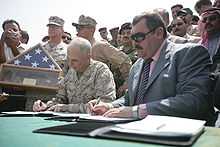Provincial Iraqi Control
The objective of the Iraqi Government and Multi-National Forces in Iraq is to achieve the transition of responsibility for each of the 18 provinces in Iraq from the Coalition to the Iraqi civil authorities, both national and local. Most attention on the issue is understandably focused on progress towards security within the provinces, both in terms of the threat from insurgents and the capability of the Iraqi Security Forces, but other factors, such as the competence and capacity of local governance is also important.[citation needed]
Provinces are subject to regular assessment by the Iraqi government and the Coalition; when a province appears to be ready, a recommendation is made to the Iraqi Ministerial Committee for National Security, with the Prime Minister making the final decision.
Provinces under Iraqi Control
As of October 2008, thirteen provinces had successfully completed transition to provincial Iraqi control: al Muthanna, Dhi Qar, Najaf, Maysan, Dahuk, Arbil, Sulaymaniyah, Karbala, Basra, Al-Qadisiyah, Al-Anbar, Babil and Wasit.
Muthanna was the first, on 13 July 2006, when Australian, Japanese and British forces from Multi-National Division-South East transferred responsibility to the Governor and local authorities. With a small and homogeneous Shia population, there had been very little militia violence and few attacks on Coalition forces in the preceding months, encouraging good progress in developing the capacity of the Iraqi armed forces and Ministry of the Interior forces there. Equally, the Governor of Muthanna enjoyed a good local mandate, having been re-elected in local elections in January 2005.[1]
Dhi Qar, also within the area of responsibility of the British-led MND-SE and the responsibility of the Italian and Romanian brigade, was handed over on 21 September 2006. .[2] Australian troops in MND-SE remained available to provide security support to the Iraqis in both Muthanna and Dhi Qar, should they request it.
Najaf, which had been garrisoned by first Polish, then US forces, was handed over on 20 December 2006.[3]
In April 2007, Maysan province became the fourth to transition to provincial Iraqi control. [4]
On May 30, 2007, the three provinces making up the Kurdistan Regional Government transitioned to provincial Iraqi control, bringing the total count to 7. [5]
In October 2007, Karbala became the eighth province to transfer to provincial Iraqi control. The transfer of Basra in December 2007 marked the half-way point in transferring all provincial security over to Iraqi security forces.[6]
In July 2008 the tenth province, Al-Qadisiyah, also transferred to Iraqi control.[6]

On September 1, 2008, in the wake of the decreasing levels of violence, the U.S. Army transferred control of the expansive Al-Anbar province over to Provincial Iraqi Control. A limited U.S. presence will be maintained to ensure security. Al-Anbar is the 11th province to be transferred to Iraqi security.
In October 2008, Babil province became the twelfth province to return to Iraqi control,[7] whilst Wasit was transferred later in the month, making it the thirteenth province to be transferred.[8]
Transition after Security Agreement signed
As of December 31, 2008, 13 of Iraq’s 18 provinces had successfully transitioned to Provincial Iraqi Control (PIC).[9] On January 1, 2009, the SA (see also U.S.–Iraq Status of Forces Agreement) between the U.S. and Iraq went into effect, transferring security responsibility to the GoI, even though not all of the provinces had completed the PIC transition process. At the request of the GoI, however, a new Joint Sub-Committee for Provincial Security was formed under the auspices of the SA to assess conditions in the remaining five Iraqi provinces that did not transition to PIC before January 1, 2009. This sub-committee met for the first time in January 2009.
See also
- Iraq War order of battle
References
- ↑ Handover of Muthanna Province
- ↑ Defence Secretary welcomes handover of Dhi Qar Province in Iraq - UK Ministry of Defence | Defence News
- ↑ Handover of Najaf province
- ↑ GlobalSecurity.org Measuring Stability and Security in Iraq
- ↑ Iraqi Security Forces Order of Battle June 2007 update - Long War Journal
- ↑ 6.0 6.1 Multi-National Force - Iraq - Provincial Iraqi Control
- ↑ http://news.bbc.co.uk/2/hi/middle_east/7685713.stm
- ↑ http://news.bbc.co.uk/2/hi/middle_east/7696785.stm
- ↑ Measuring Stability and Security in Iraq March 2009